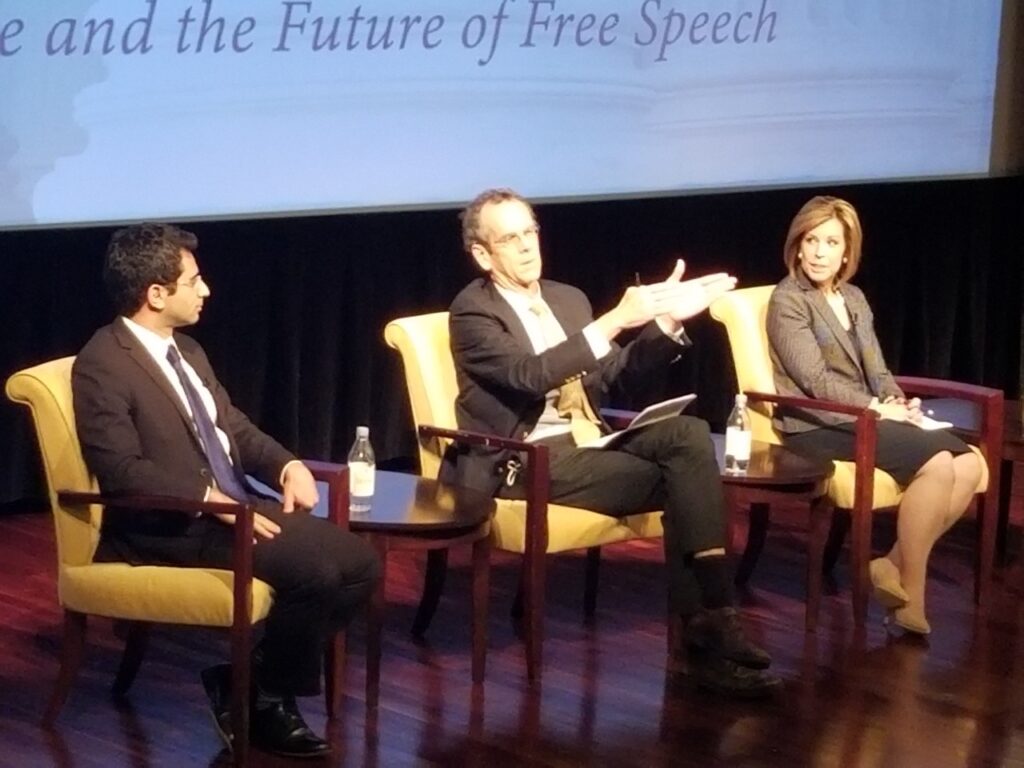
At an Oct. 25 event hosted by Alliance Defending Freedom (ADF), an attorney with the American Civil Liberties Union (ACLU) argued that anti-discrimination laws should be interpreted in ways that restrict the decisions of business owners, even when they have nothing to do with the identity of the customer, an interpretation that gives governments broad power to restrict freedom of speech.
The event, “303 Creative and the Future of Free Speech,” featured a panel discussion between ADF CEO and General Counsel Kristen Waggoner, ACLU National Legal Director David Cole, and Notre Dame Law School Associate Professor Sherif Girgis.
The discussion was about 303 Creative v. Elenis, a free speech case the Supreme Court is scheduled to hear in December. Lorie Smith, who runs 303 Creative, is a Christian graphic designer who declined to create a wedding website for a same-sex couple. Smith says she based her decision on the message the website would convey, not on the person requesting it. Waggoner is scheduled to argue Smith’s case before the United States Supreme Court on Dec. 5.
Cole argued that Smith’s decision was an act of identity-based discrimination, while Waggoner argued it was an exercise of Smith’s constitutionally protected right to free speech.

At the end of the panel discussion, a member of the audience asked Cole whether it would be legal or illegal for an artist to decline to design a website celebrating same-sex marriage if the person requesting the website was not homosexual.
According to Cole, it would depend on the specific facts.
“For example, in Masterpiece Cake Shop,” Cole said, “if instead of Charlie and Dave, our clients, it was Charlie’s mom, who was heterosexual, asking the baker to make this cake for a same-sex wedding and he would make the exact same cake for an opposite-sex wedding, the only thing that’s different is for whom it is ultimately being used, yeah, that would be discrimination based on identity,” Cole said.
Girgis asked Cole, “In the scenario where it’s a straight person who wants to celebrate and promote same-sex marriage, so they ask for a website that has content promoting same-sex marriage — there’s no protected identity issue in the picture — it sounds like you’re saying it’s okay to refuse that because forcing you to make that would be compelled speech.” Cole agreed.
By interpreting Colorado’s anti-discrimination law this way, Cole essentially argued that declining to create a website celebrating a same-sex marriage is free speech while declining to create a website celebrating a specific same-sex wedding is discrimination, regardless of who requests the website design.
In 2017 Cole and Waggoner argued opposite sides of Masterpiece Cakeshop v. Colorado Civil Rights Commission, the case in which the Supreme Court ruled in favor of Christian baker Jack Phillips, who declined to create a custom wedding cake for a same-sex couple.
Smith’s case picks up where Phillips’ case left off. As Waggoner previously told The Federalist, “Free speech and free exercise were in Masterpiece, but the court’s holding was based on free exercise — it didn’t touch the free speech arguments. 303 Creative deals with those free speech arguments.”
Waggoner argued that free speech was at stake in 303 Creative, and not just for Smith but for all Americans.
“Lorie does not lose her Constitutional rights by entering the square any more than the LGBT designer or the pro-abortion photographer who are also going to lose their rights when Lorie loses hers. And I think that’s important because there is no limiting principle when you’re writing a blank check to the government to say, ‘Take away these free speech rights; we trust you to manage them.’”









